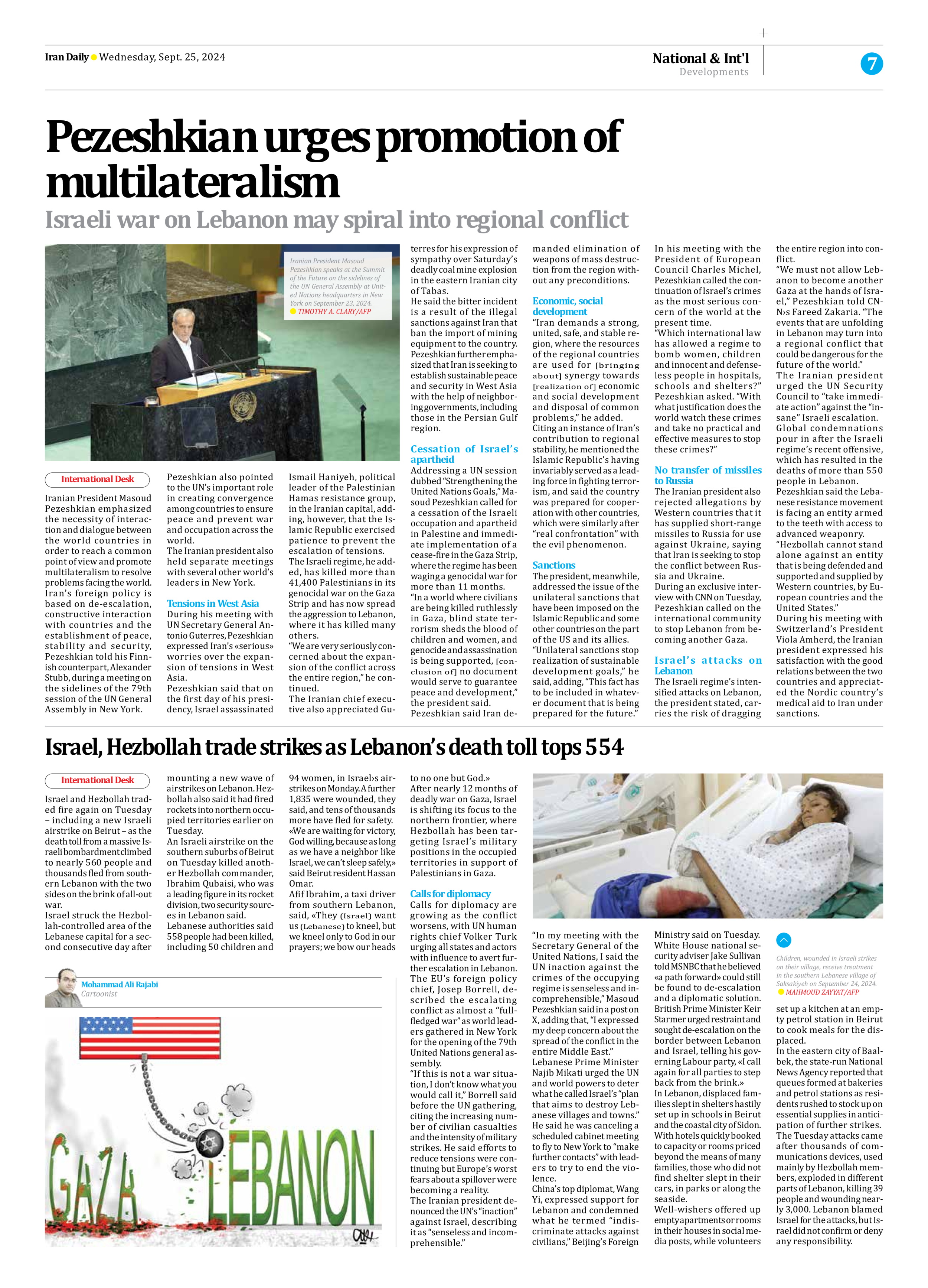
Israel, Hezbollah trade strikes as Lebanon’s death toll tops 550
Israel and Hezbollah traded fire again on Tuesday – including a new Israeli airstrike on Beirut – as the death toll from a massive Israeli bombardment climbed to nearly 560 people and thousands fled from southern Lebanon with the two sides on the brink of all-out war.
Israel struck the Hezbollah-controlled area of the Lebanese capital for a second consecutive day after mounting a new wave of airstrikes on Lebanon. Hezbollah also said it had fired rockets into northern occupied territories earlier on Tuesday.
An Israeli airstrike on the southern suburbs of Beirut on Tuesday killed another Hezbollah commander, Ibrahim Qubaisi, who was a leading figure in its rocket division, two security sources in Lebanon said.
Lebanese authorities said 558 people had been killed, including 50 children and 94 women, in Israel›s airstrikes on Monday. A further 1,835 were wounded, they said, and tens of thousands more have fled for safety.
«We are waiting for victory, God willing, because as long as we have a neighbor like Israel, we can’t sleep safely,» said Beirut resident Hassan Omar.
Afif Ibrahim, a taxi driver from southern Lebanon, said, «They (Israel) want us (Lebanese) to kneel, but we kneel only to God in our prayers; we bow our heads to no one but God.»
After nearly 12 months of deadly war on Gaza, Israel is shifting its focus to the northern frontier, where Hezbollah has been targeting Israel’s military positions in the occupied territories in support of Palestinians in Gaza.
Calls for diplomacy
Calls for diplomacy are growing as the conflict worsens, with UN human rights chief Volker Turk urging all states and actors with influence to avert further escalation in Lebanon.
The EU’s foreign policy chief, Josep Borrell, described the escalating conflict as almost a “full-fledged war” as world leaders gathered in New York for the opening of the 79th United Nations general assembly.
“If this is not a war situation, I don’t know what you would call it,” Borrell said before the UN gathering, citing the increasing number of civilian casualties and the intensity of military strikes. He said efforts to reduce tensions were continuing but Europe’s worst fears about a spillover were becoming a reality.
The Iranian president denounced the UN’s “inaction” against Israel, describing it as “senseless and incomprehensible.”
“In my meeting with the Secretary General of the United Nations, I said the UN inaction against the crimes of the occupying regime is senseless and incomprehensible,” Masoud Pezeshkian said in a post on X, adding that, “I expressed my deep concern about the spread of the conflict in the entire Middle East.”
Lebanese Prime Minister Najib Mikati urged the UN and world powers to deter what he called Israel’s “plan that aims to destroy Lebanese villages and towns.” He said he was canceling a scheduled cabinet meeting to fly to New York to “make further contacts” with leaders to try to end the violence.
China’s top diplomat, Wang Yi, expressed support for Lebanon and condemned what he termed “indiscriminate attacks against civilians,” Beijing’s Foreign Ministry said on Tuesday.
White House national security adviser Jake Sullivan told MSNBC that he believed «a path forward» could still be found to de-escalation and a diplomatic solution.
British Prime Minister Keir Starmer urged restraint and sought de-escalation on the border between Lebanon and Israel, telling his governing Labour party, «I call again for all parties to step back from the brink.»
In Lebanon, displaced families slept in shelters hastily set up in schools in Beirut and the coastal city of Sidon. With hotels quickly booked to capacity or rooms priced beyond the means of many families, those who did not find shelter slept in their cars, in parks or along the seaside.
Well-wishers offered up empty apartments or rooms in their houses in social media posts, while volunteers set up a kitchen at an empty petrol station in Beirut to cook meals for the displaced.
In the eastern city of Baalbek, the state-run National News Agency reported that queues formed at bakeries and petrol stations as residents rushed to stock up on essential supplies in anticipation of further strikes.
The Tuesday attacks came after thousands of communications devices, used mainly by Hezbollah members, exploded in different parts of Lebanon, killing 39 people and wounding nearly 3,000. Lebanon blamed Israel for the attacks, but Israel did not confirm or deny any responsibility.







